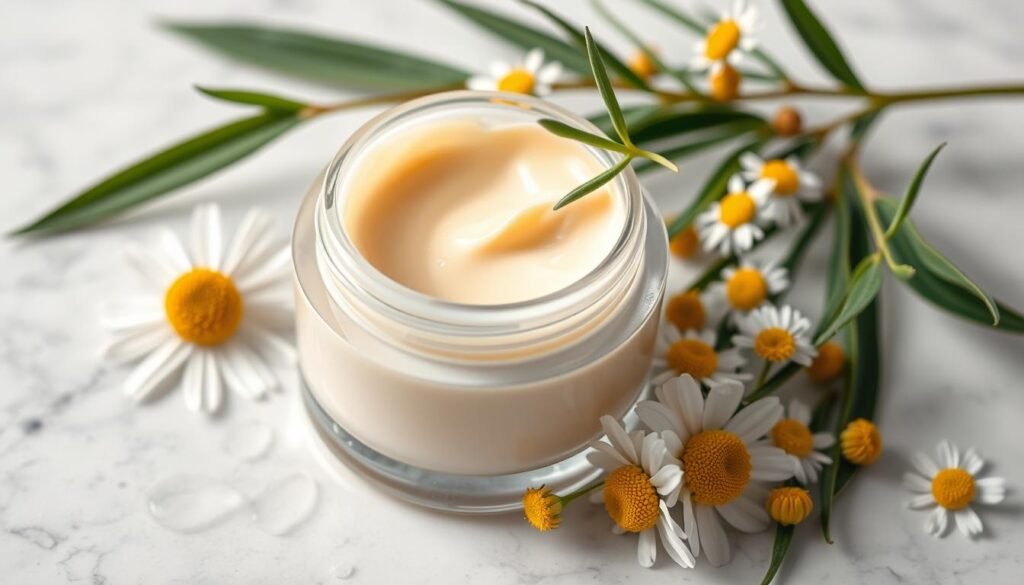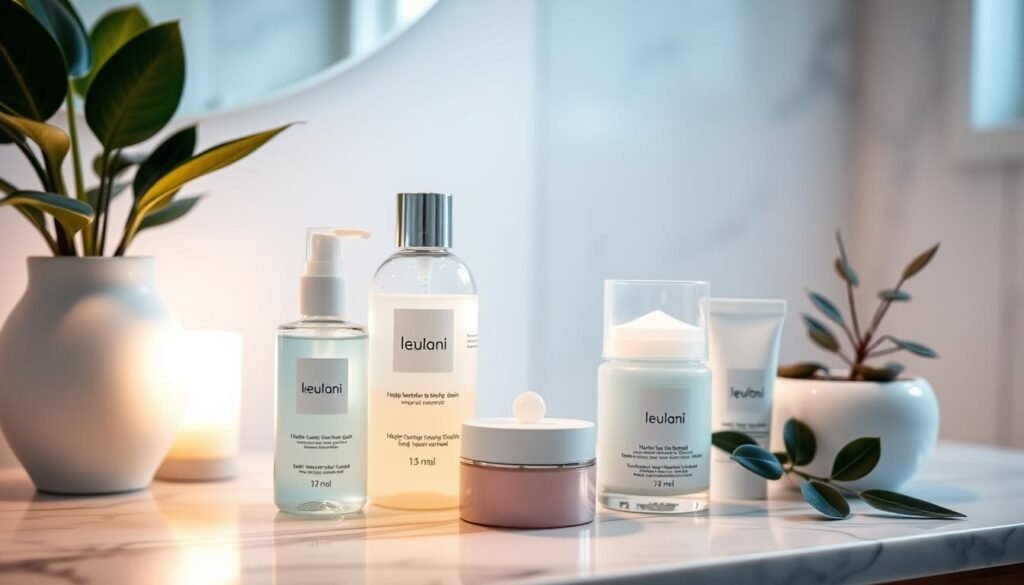Did you know about 85% of young people experience acne? This fact shows how common acne is. It also underlines the need to know how to care for acne-prone skin. An important yet often ignored part of this care is moisturizing. Even if it sounds strange, keeping acne-prone skin hydrated is key. It helps without making breakouts worse.
Finding the right products is a big step towards healthier skin. This guide focuses on the importance of choosing Non-Comedogenic Moisturizers and oil-free options. These are best for those with acne-prone skin. With the right moisturizers, you can better your skin care routine. This means clearer and happier skin for you.
Key Takeaways
- Moisturizing is crucial for acne-prone skin to prevent excessive dryness.
- Non-Comedogenic Moisturizers help avoid clogged pores.
- Oil-Free Formulations are effective for hydration without added oils.
- Choosing the right products can improve overall skin health.
- Informed decisions lead to better skincare results and less irritation.
- Understanding individual skin types is key in selecting moisturizers.
The Importance of Moisturizing Acne-Prone Skin
Moisturizing is key for people with acne-prone skin. Many skip this step, fearing more breakouts. But, proper hydration keeps the skin’s barrier strong, preventing dryness.
Dry skin can cause irritation and more oil, leading to more acne. Knowing the perks of moisturizing can boost your skin’s health. It helps heal and prevent new blemishes.
Studies show regular moisturizing reduces acne problems. Your skincare routine should include the right moisturizer for you. Choose lightweight, non-comedogenic products to hydrate without blocking pores.
Understanding Non-Comedogenic Moisturizers
Choosing the right moisturizer is key for those with acne-prone skin. Non-Comedogenic Moisturizers are great because they hydrate without blocking pores. This helps prevent breakouts. These products use light oils and water-based solutions for moisture without the acne risk.
Neutrogena Hydro Boost Gel-Cream and La Roche-Posay Effaclar are top non-comedogenic picks. They hydrate skin and help stop acne. The ingredients keep the skin balanced, which is important for avoiding pimples.
Knowing about non-comedogenic moisturizers can make your skin healthier. It’s good to know what “fragrance-free” and “allergy-tested” mean. They help you choose better for your skin type. For more, see fragrance-free guidelines.
It’s important to keep skin hydrated with the right moisturizer for acne prevention. Skin types vary, so finding the perfect product matters. The right choice hydrates and strengthens skin. Learn how to pick the best products for clearer skin.
Key Hydrating Ingredients for Acne-Prone Skin
Keeping your skin hydrated is key, especially if you have acne. Hyaluronic Acid and Glycerin stand out because they moisturize without clogging pores.
Hyaluronic Acid is known for its amazing moisture retention. It can hold up to 1,000 times its weight in water. This means it deeply hydrates the skin, reducing dryness for those with acne.
Like Hyaluronic Acid, Glycerin helps by pulling water to the skin. Its light feel means it adds moisture without making the skin oily. This makes it great for people with oily or acne-prone skin.
Aloe vera and niacinamide are also excellent for hydration. Aloe vera calms the skin while moisturizing. Niacinamide fights inflammation and smooths the skin’s texture. Adding these ingredients to your skincare routine can boost moisture. This helps keep acne-prone skin healthy and clear.
Oil-Free Formulations: Why They Matter
Oil-Free Formulations are key for people with acne-prone skin. They help avoid clogged pores and reduce shine. This leads to a more balanced look. For acne management, pick moisturizers that hydrate without adding oil.
Clinique Dramatically Different Hydrating Jelly is a great example of effective lightweight moisturizers. These products keep the skin moist but not oily. Using lightweight moisturizers makes the skin feel fresh and healthy.
Finding the right oil-free moisturizer can change your skin care game. For more options for different skin types, check out this insightful resource. The best products tackle acne and keep your skin moisturized.
Moisturizing Acne-Prone Skin: Finding Your Ideal Product
Looking for the right moisturizer for acne-prone skin means considering your skin type. Everyone’s skin is unique, requiring different care. Knowing these needs can majorly improve your skin’s health.
Consider Your Skin Type
Choosing moisturizers based on skin type is key. If you have oily skin, pick light, oil-free products that hydrate without blocking pores. Those with dry skin need thicker creams for more moisture. And if you have combination skin, you’ll want something that balances moisture all over. Recognizing your skin type helps you moisturize effectively, helping manage acne better.
Look for Dermatologist-Recommended Products
Going for dermatologist-recommended products often leads to better outcomes. Brands like Cetaphil, Neutrogena, and La Roche-Posay get high marks from skin care experts for their acne-friendly formulas. These products are crafted with professional insights to fit different skin needs. Having a dermatologist’s recommendation can give you extra confidence in your choice of moisturizer.
| Skin Type | Recommended Product Type | Example Brands |
|---|---|---|
| Oily | Oil-free gel or lotion | Neutrogena, Cetaphil |
| Dry | Rich cream | CeraVe, La Roche-Posay |
| Combination | Lightweight lotion | Clinique, Kiehl’s |
The Role of Acne-Fighting Properties in Moisturizers
Moisturizers for acne-prone skin do more than hydrate. They contain key ingredients like Salicylic Acid and Benzoyl Peroxide. These help treat and prevent breakouts while keeping skin moist.
Salicylic Acid and Benzoyl Peroxide exfoliate dead cells and kill bacteria. This makes the skin healthier.
It’s important to pick a moisturizer with both ingredients working together. Salicylic Acid clears pores by removing excess oil. This helps prevent more breakouts.
Benzoyl Peroxide fights skin bacteria. It reduces inflammation and redness. This makes the skin look better.
Today’s moisturizers blend hydration with treatment. Look for products that showcase these acne-fighting features. They offer both hydration and acne control.

Benefits of Pore-Unclogging Ingredients
The ingredients that unclog pores are key to healthy skin, especially if you get acne. Ingredients like alpha and beta-hydroxy acids are vital. They do wonders by removing dead skin and stopping pores from getting blocked.
These exfoliating ingredients are crucial for keeping your skin clear. They do more than just clean. They also control the oil on your face. By doing this, they fight off acne and make your skin smoother. Adding these to your daily skin care can really change how you handle acne.
One great example is Paula’s Choice BHA liquid exfoliant. It has salicylic acid that goes deep into the pores to clear out the bad stuff. People who use it often see their skin get clearer with regular use. This shows how important these products are in fighting acne.
| Product Name | Key Ingredient | Pore-Unclogging Benefits |
|---|---|---|
| Paula’s Choice BHA Liquid Exfoliant | Salicylic Acid | Deep cleansing of pores, reduces breakouts |
| Neutrogena Oil-Free Acne Wash | Glycolic Acid | Exfoliates surface impurities, promotes clearer skin |
| The Ordinary Glycolic Acid 7% Toning Solution | Glycolic Acid | Enhances exfoliation, improves overall skin texture |
Tips for Balancing Sebum Production
Balancing your skin’s sebum is key for acne-free, healthy skin. We’ll share tips to tweak your moisturizing habits. These changes cater to the weather and your body’s hormonal cycles. By finding the right balance, you can achieve a clear, glowy skin while keeping your pores unclogged.
Adjust Your Moisturizing Routine
Changing your moisturizer can alter your skin’s oiliness. Here are a few tips to get you started:
- Watch for changes in the weather and change your hydration level as needed.
- Notice hormonal changes and modify how often or what type of moisturizer you use.
- Choose lighter lotions in the heat and thicker creams in dry conditions.
Incorporate Lightweight Formulations
For those with acne, it’s crucial to use lightweight products. They hydrate your skin without being too heavy. Here’s why they’re important:
- They moisturize but don’t make your skin oily.
- They help avoid blocked pores, reducing breakouts.
- They support a clear, healthy skin look.
Soothing Inflammation with the Right Products
People with acne-prone skin often deal with redness and irritation. Choosing the right products can make a big difference. Look for those with green tea extract, calendula, and chamomile to soothe inflammation.
These ingredients help calm the skin and improve your complexion. For example, First Aid Beauty Ultra Repair Cream uses these to calm and moisturize. It won’t clog pores. Users see less redness and irritation quickly after using it.
Here’s a look at some products that are great for calming inflammation:
| Product | Key Ingredients | Benefits |
|---|---|---|
| First Aid Beauty Ultra Repair Cream | Oatmeal, Allantoin, Ceramides | Provides immediate relief from dry, irritated skin while soothes inflammation. |
| Paula’s Choice Calm Redness Relief | Calendula, Chamomile, Licorice | Reduces redness and enhances skin barrier function. |
| Neutrogena Hydro Boost Water Gel | Hyaluronic Acid, Glycerin | Delivers deep hydration, combats dryness, and calms inflammation without grease. |

Adding these products to your skincare can keep your skin moist and calm. It’s key to choose products that focus on calming moisture. Finding products with the right anti-inflammatory ingredients is important in managing inflammation well.
Recommendations for Gentle Cleansing
Good skincare starts with gentle cleansing, crucial for those with acne-prone skin. It’s important to choose the right cleanser. The wrong one can remove natural moisture, causing irritation and more breakouts. Non-stripping cleansers are key in an acne treatment routine. They remove dirt without harming the skin’s barrier.
Look for cleansers that hydrate as they cleanse. A great choice is CeraVe Hydrating Facial Cleanser. It contains ceramides and hyaluronic acid. These ingredients keep moisture in while getting rid of dirt and oil.
Selecting the right cleansing routine is critical:
- Hydration: Ideal cleansers make skin feel soft and supple without tightness.
- Mild Formulation: Look for products without harsh sulfates to avoid irritation.
- Dermatologist-Recommended: Choose cleansers endorsed by skin experts.
Using gentle products in an acne routine can balance the skin and prevent breakouts. The aim is to cleanse effectively while keeping the skin’s natural moisture.
| Brand | Product | Key Ingredients | Benefits |
|---|---|---|---|
| CeraVe | Hydrating Facial Cleanser | Ceramides, Hyaluronic Acid | Retains moisture, gentle on skin |
| Neutrogena | Hydro Boost Cleanser | Hyaluronic Acid | Deep hydration, non-stripping |
| La Roche-Posay | Effaclar Purifying Foaming Gel | Purifying agents, Glycerin | Removes impurities, gentle formula |
Conclusion
Keeping acne-prone skin moisturized is very important for a balanced, healthy look. This guide underlines the need for right products. Ones that are non-comedogenic and full of good, moistening elements are best. Using moisture helps avoid dryness and irritation, which can cause more breakouts.
Adding good habits to your skincare can greatly help. It’s crucial to pick moisturizers that hydrate and fight acne. Look for oil-free and acne-fighting ingredients to keep skin clear and moisturized. Clear, healthy skin comes from making smart choices and being consistent.
Knowing which moisturizers work best and using them daily leads to healthier skin. Stick to the best skincare strategies for a rewarding journey. This way, having clear, well-moisturized skin is not only doable but can be fun too.